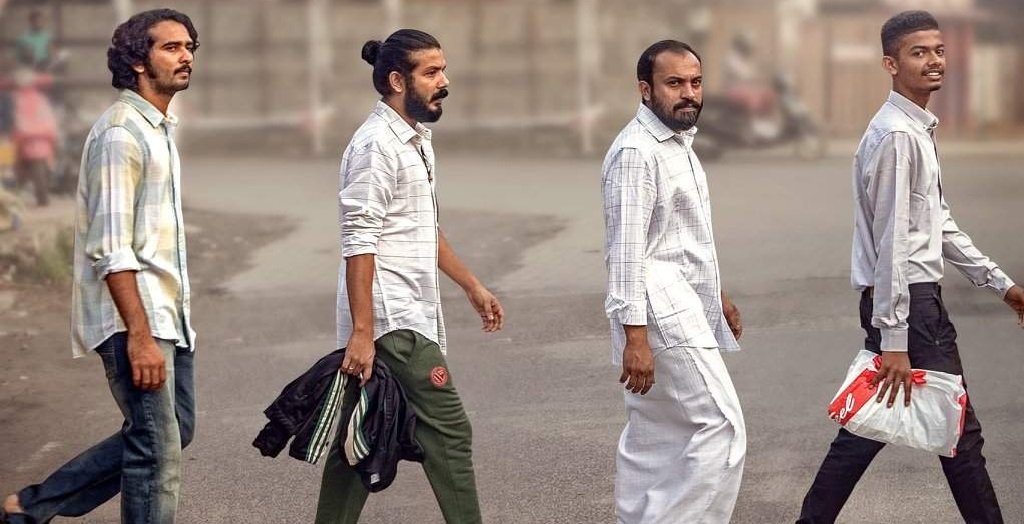One of 2019’s biggest
Malayalam hits, Kumbalangi Nights forms a superior example of those
lay-of-the-land movies that build a world and properly study their characters
before foisting anything so urgent, vulgar or trifling as a plot upon us. At its
centre sit four varyingly useless brothers, stranded without parents on the
banks of a river winding through the titular Keralan tourist hotspot. The two
oldest are introduced at one another’s throats, where they’ve apparently been
for most of their lives: these are Saji (Soubin Shahir), a sentimental,
oft-shirtless bruiser, and Bobby (Shane Nigam), a mop-topped slacker who’s
renounced weed on the grounds it “makes you think, and I am not the thinking
type”, a self-insight he goes on to prove with his clumsy pawing of sweetheart
Baby (Anna Ben).
A third sibling, the mute and
melancholy Boney (Sreenath Bhasi) has already bailed and left these two to each
other’s devices, partly because he hasn’t the voice to raise, partly because he’s
tired of the pair’s bullshit. The youngest, teenage Franky (Mathew Thomas),
shows a degree of potential – he’s a team player on the soccer pitch, has a
scholarship awaiting him, and appears rather charmingly beguiled by the
opposite sex – but we might well wonder whether this will be allowed to
coalesce into anything more substantial, given the clownishness and toxicity of
his housemates. Calmly and naturalistically, the film sets down a gauntlet for
these bros to run: can any of them grow up and become a man without taking on
the worst characteristics of those around them?
Keen as they might be to run
their mouths, the film they’re in – written by Syam Pushkaran, and directed by
Madhu Narayanan – is instead characterised by a thoughtful silence: it
transports us to one of this planet’s quieter, prettier spots, and never feels
the need to overcompensate with score, action or frantic jabber, allowing
scenes to present as reflective or stilled, like the Kumbalangi waterways.
Beneath this placid surface, however, there’s a fair bit going on, not least a
tacit understanding of the wider imbalances at play in this patriarchal neck of
the woods. These brothers have been afforded a certain freedom and power, but they
haven’t fully comprehended what to do with it, and are thus prone to abusing it
somehow.
Much of the onscreen activity
could be defined as relaxed human comedy, but we’re constantly aware how close
some of it comes to a knife-edge. It’s literal when Bobby submits to a shave
while asking his putative brother-in-law, the uptight barber Shammy (Fahadh
Faasil), for Baby’s hand in marriage; more metaphorical when Saji comes round
from a botched suicide attempt to be offered not counselling, but a slap in the
face from a police inspector and the fates alike. These guys can be good
together – Pushkaran carefully punctuates the squabbling with moments of
genuine fraternal camaraderie – but for two-thirds of the film, we’re just
waiting for one of them to put their foot in any given situation, if not to
rashly dive in two-footed.
That we’re never disheartened
or repulsed entirely is down to Narayanan’s excellent ensemble, particularly
his leads, who temper the worst aspects of maleness with vivid flickers of
promise that suggest we may still witness a positive outcome. Crucially, no-one
strides onto screen with the conventional bearing of a hero; these actors never
radiate that vanity, so we believe in them as the kind of blundering dumbos anybody
possessed of a penis can be in the absence of proper guidance. Narayanan’s
direction assumes a forgiving quality: it’s never indulgent, however becalmed
matters seem, but it insists on allowing the brothers time and space, in the
hope they’ll see the error of their ways and take some form of responsibility
before the credits roll.
The final third – in which
women cross the boys’ threshold, obliging them to adapt accordingly – initially
plays a touch gentle after all the roughhousing, but it feels healthier, too: a
detox that enables the brothers to reconnect with emotions they walled off
after their abandonment. They’ll need to, because this surprising, edifying
entertainment has one final twist, which has as much to do with genre as it
does with the characters we’ve spent the better part of two hours getting to
know. That’s best left for you to discover, but it’s a development that makes
explicit the question underpinning all Kumbalangi Nights’ inquiries: if
our homes and our movies can change shape for the better, why on earth can’t
the men who inhabit them?
Kumbalangi Nights is now streaming on Amazon Prime.

No comments:
Post a Comment